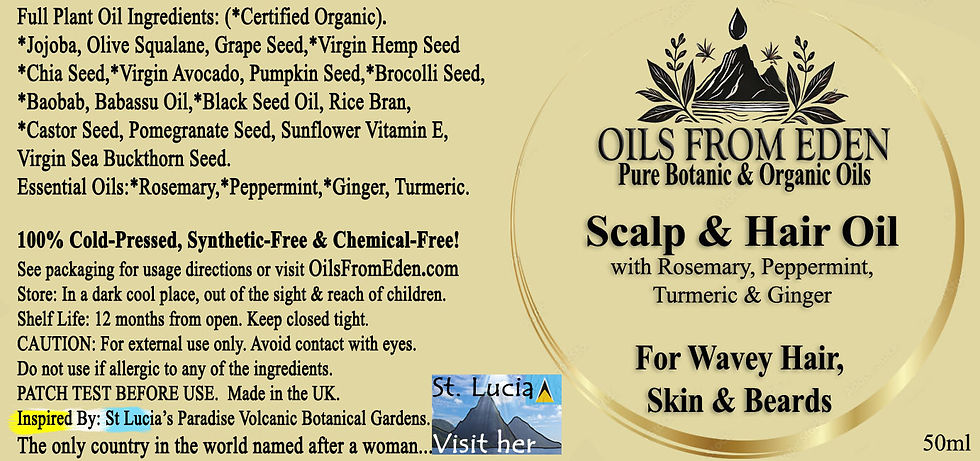Understanding DHT and its role in Scalp Health, and Hair Growth
- garryherbert
- Nov 2, 2024
- 4 min read
Updated: Nov 12, 2024
In the journey toward strong, resilient hair, understanding the role of DHT and its effects on scalp health is crucial. Many people experience hair thinning or loss, and one significant contributor to this is dihydrotestosterone (DHT), a hormone that can affect hair follicles and scalp health. In this post, we'll explore what DHT is, how it impacts hair growth, and some natural ways to help maintain a healthy scalp and encourage optimal hair growth.
What is DHT?
Dihydrotestosterone, or DHT, is a hormone derived from testosterone and is naturally present in both men and women. While it's essential for several functions in the body, DHT can be a contributing factor to hair loss. This is particularly true for those genetically predisposed to hair thinning or androgenetic alopecia, often known as pattern baldness.
DHT binds to receptors in the hair follicles, especially on the scalp, which can lead to follicle shrinkage over time. As follicles shrink, hair growth weakens and may eventually cease altogether, leading to thinning and hair loss. DHT-related hair loss typically affects the hairline and crown first and may progress without the right supportive care.
How DHT Affects Scalp Health
While DHT primarily affects hair follicles, its impact extends to scalp health as well. Excess DHT can increase oil production, potentially leading to a greasy scalp, which might clog pores and contribute to irritation. This can disrupt the scalp's natural balance, impacting the environment in which hair grows. A compromised scalp may become prone to inflammation, dryness, and buildup, creating an inhospitable environment for healthy hair.
Natural Ingredients That Support Hair and Scalp Health
At Oils from Eden, we believe in harnessing nature's best ingredients to support healthy, vibrant hair. Many natural oils can nourish the scalp, promote a balanced environment, and support hair follicles against the effects of DHT. Here are some oils that are ideal for strengthening hair, encouraging growth, and supporting scalp health:
1. Pumpkin Seed Oil
Pumpkin seed oil is rich in zinc and antioxidants, which are believed to inhibit DHT production. Its essential fatty acids and vitamins can moisturize the scalp and strengthen hair follicles, supporting growth and reducing the risk of hair loss. This oil is lightweight and absorbs quickly, making it a popular choice for scalp massages.
2. Rosemary Essential Oil
Known for its circulation-boosting properties, rosemary oil has been traditionally used to stimulate hair growth. It helps invigorate the scalp, allowing hair follicles to receive essential nutrients. Studies suggest rosemary may inhibit DHT, supporting the health and longevity of hair strands.
3. Peppermint Essential Oil
The menthol in peppermint oil cools and soothes the scalp, helping to balance excess oil production and reduce buildup. Peppermint oil may also promote circulation to the scalp, encouraging stronger roots. For people with DHT sensitivity, its cleansing and stimulating properties help create a more balanced environment on the scalp.
4. Neem Oil
Neem oil, known for its antibacterial and antifungal properties, helps maintain a clean and balanced scalp. It also soothes scalp inflammation and irritation, which is beneficial for scalp health. Neem’s rich composition of fatty acids, antioxidants, and vitamin E nourish and protect hair from environmental stressors, helping it grow thicker and stronger.
5. Chia Seed Oil
Chia seed oil is packed with omega-3 fatty acids, which help nourish and fortify hair strands, protecting them against brittleness and breakage. By supporting the hair's lipid layer, chia seed oil adds strength and resilience. Its lightweight, non-greasy nature makes it perfect for hair and scalp blends focused on hair growth.
How to Use These Ingredients for Best Results
When creating a DHT-focused routine, consistency is key. Regularly massage these oils into your scalp to stimulate blood flow and allow the beneficial compounds to penetrate deeply. Here’s a simple routine to try:
Warm the Oil Blend: Combine pumpkin seed oil, rosemary, peppermint, and neem oil. Warm a few drops in your hands.
Massage the Scalp: Using gentle, circular motions, massage the oil into the scalp for 3-5 minutes. This encourages circulation and can help absorb nutrients.
Leave It In: Allow the oils to sit on the scalp for 30 minutes to an hour, or even overnight if your hair type allows.
Wash with a Mild Shampoo: Cleanse your scalp with a gentle, sulfate-free shampoo to remove excess oil without stripping the scalp's natural moisture.
The Importance of a Balanced Scalp Environment
Healthy hair growth relies on a balanced scalp environment. Excess oil, product buildup, or frequent irritation can compromise hair quality and lead to breakage. Ensure your routine is gentle, focusing on nourishing and supporting the scalp rather than harsh cleansing.
Final Thoughts
Understanding DHT’s role in hair health is essential for supporting long-term hair vitality. By incorporating natural oils that can nourish the scalp and support hair follicles, you’re creating a foundation for strong, healthy hair. Remember, hair growth takes time, so be patient with your routine, and let nature work its magic on your journey to beautiful, resilient hair.
At Oils from Eden, we are dedicated to providing products that align with natural, balanced hair and scalp care. For more tips, insights, and blends that support your unique hair needs, explore our range of nature-inspired, nourishing oils.




Kommentare